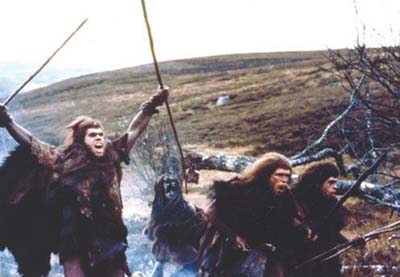 I think this educated guess of a movie has held up well after 30 years. We’ve made major strides in anthropology since then (we aren’t descended from Neanderthals now) but I wonder if beginner courses ever show Quest with genuine interest to the students. It certainly takes the patience of a scientist to watch it in its entirety because our ancestors didn’t speak any intelligible language 80,000 years ago and the director chose to not include subtitles.
I think this educated guess of a movie has held up well after 30 years. We’ve made major strides in anthropology since then (we aren’t descended from Neanderthals now) but I wonder if beginner courses ever show Quest with genuine interest to the students. It certainly takes the patience of a scientist to watch it in its entirety because our ancestors didn’t speak any intelligible language 80,000 years ago and the director chose to not include subtitles.
Thirty years ago when this debuted in theaters I wanted to see it thanks to an interesting Sci-Fi magazine article covering it. My parents objected due to the R rating so I gave up. Then Quest had its run on HBO a year later (back when the lag was 12-plus months between the theater and cable). I caught it in bits and pieces when mom wasn’t around and figured out what her issue with the movie was…Quest is rather graphically candid about early mankind’s attitude with sex. I may have been 14 but I already knew the difference between porn and art; few teenage boys get turned on by Rae Dawn Chong being covered in just ashes, mud and (probably) feces.
Three decades later I finally got around to seeing this through Netflix (it’s no longer around for streaming) during my stretch of illness and it was pretty cool.
It begins with a little explanation about fire’s importance to early humans: heat and security namely. Few knew how to generate it so most came into possession of fire accidentally (lightning hitting a tree) or stole it from another group. This was the lot for the Ulam tribe. When they’re attacked by the more vicious, ape-like Wagabu, the Ulam flee to a marsh. During the retreat, the tribal fire tender lets the remaining fire they had die out. Doomed without a new source, three tribesmen: Naoh, Amoukar (Ron Perlman always did have that natural caveman brow) and Gaw are recruited to get some more before the cold weather arrives. Should they fail, the Ulam will die out from exposure, starvation and/or wolf attacks.
The trio head some direction, it’s not clear where they’re headed, avoid a sabretooth tiger attack and run afoul of the Kzamm who resorted to cannibalism as noted by a Ivaka prisoner’s missing limb. Still the Kzamm do have an active fire so the Ulam heroes make an attempt to steal it. They fail and now they have a flesh-eating tribe of redheads chasing them with Ika (another Ivaka survivor) in tow. A convenient Wooly mammoth herd eliminates any further trouble since these elephant precursors scare aware even the nastiest, hungriest man-eaters.
“Romance” blossoms, more like rutting, between Ika and Naoh while they’re returning to the Ulam camp empty handed. One day, Ika senses they’re near her tribe but the Ulam aren’t interested so she runs away. Naoh pursues, discovers a village and gets captured in the residents’ marsh trap. His captors turn out to be the Ivaka, a more advanced group: they have huts, language, body ornamentation, pottery, atlatls (sophisticated weapons compared to the Ulam’s, Kzamm’s and Wagabu’s sharp sticks) and the means to create fire. If they had agriculture, the Ivaka could be the progenitors of modern humans in some circles. These technical innovations don’t include compassion as they taunt Naoh through some politically incorrect, crude reproductive and initiation rites.
Eventually Naoh’s buddies Amoukar and Gaw come to rescue him only to be captured by the same trap. The Ivaka with Naoh proceed to give their latest guests the same treatment but somehow Amoukar and Gaw have no difficulty breaking out the next evening. Naoh refuses to return home though, thus Amoukar knocks him unconscious and carries him off with other stolen supplies, namely fire. Ika rejoins them as they all flee back to Ulam turf.
The joyous homecoming is short lived. Once again the fire tender extinguishes what the heroes brought back and now everybody wants to kick his ass; never mind it was the tribe’s roughhousing style of celebrating that pushed him into the water. The questers intervene, tell the others to relax, there’s no need to kill the clumsy tender, Naoh learned how to make fire. Naoh gives it his best shot and fails. Fortunately, this is a standard skill amongst the Ivaka as Ika saves the day.
Quest is certainly a more serious, mature attempt to tell a story about pre-historic times which was enjoyable and refreshing for its bluntness or attempted accuracy. Lately, Hollywood’s closest endeavor was 10,000 BC which proves how the powers that be prefer to make something awful (in Newspeak a popcorn movie) instead of daring.
